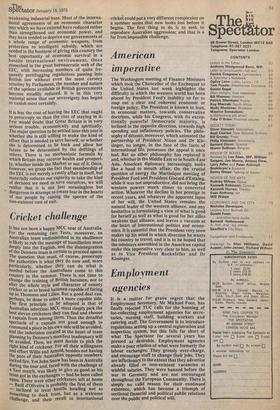American imperative
The Washington meeting of Finance Ministers which took the Chancellor of the Exchequer to the United States last week highlights the difficulty in which the western world has been placed by President Ford's inability so far to map out a clear and coherent economic or foreign policy. The President is known to lean, in economic matters, towards conservative doctrines, while his Congress, with its exceptionally powerful Democratic majority, is inclined in the opposite direction, towards high spending and inflationary policies. The philosophy of détente, moreover, which animated the partnership of President Nixon and Dr Kissinger, no longer, in the face of the facts of international life, possesses the appeal it once had. But no other philosophy has replaced it and, whether in the Middle East or in South-East Asia, American diplomacy increasingly looks like a hand to mouth affair. On the crucial . question of energy the Martinique meeting of President Ford and President Giscard d'Estaing, while it was not unproductive, did not bring the western powers much closer to concerted action. Whatever the decline in her prestige in recent years, and whatever the apparent lapse of her will, the United States remains the natural leader of the western alliance, and any hesitation in formulating a view of what is good for herself as well as what is good for her allies weakens that alliance, and leaves a vacuum at the heart of international politics and economics. It is essential that the President very soon makes up his mind in which direction he wants his country to travel; and it is to be hoped that the ministers assembled in the American capital make this imperative very clear to him, as well as to Vice President Rockefeller and Dr Kissinger.


































 Previous page
Previous page